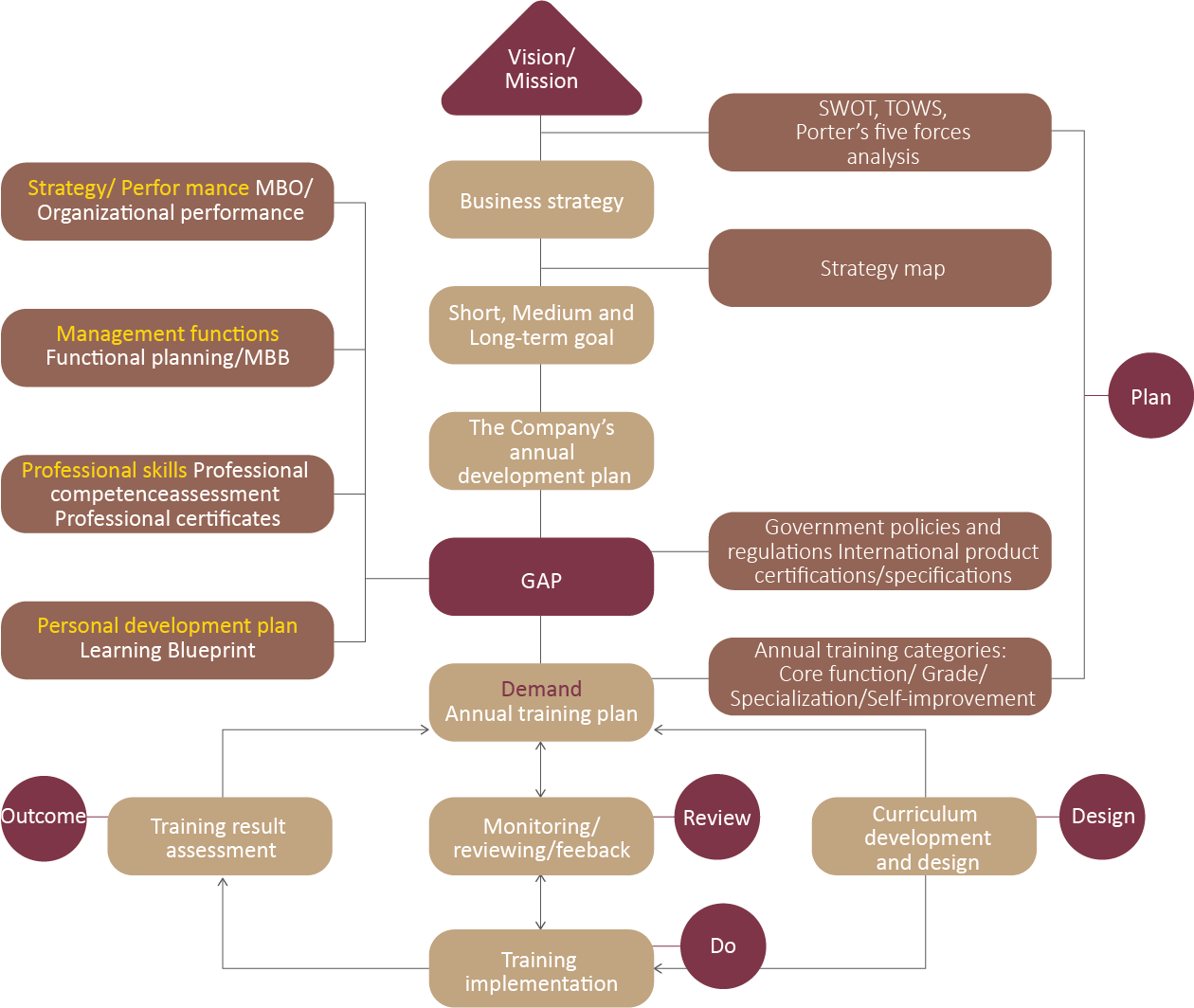Talent Development and Nourishment at Depth

Here at YOKE, we emphasize holistic learning and development for employees. By taking the Company’s vision and mission into account and through the analyses of the internal/external operating environment (i.e. Porter’s five forces analysis, SWOT analysis, TOWS analysis and so forth), we were able to formulate our business strategies, from which we derive our short, medium and long-term development plans.
Our annual training plan is formulated each year in November based on the need for internal/external training submitted by different departments and YOKE’s annual development plan in conjunction with our internal On the Job (OJT) training to boost employees’ professional competence.
Digital transformation of learning and development
In response to the need for corporate governance and sustainable development, we introduced the e-learning platform in 2020 to achieve e-management for internal training course registration, post-training evaluation and certification, external training records, and external training application and approval. We began producing e-learning courses in 2021. In 2022 we arranged training for instructors of e-learning courses for instructors to understand the framework of lesson plan production and tonal expression for e-learning courses so as to improve the quality of e-learning course production. By progressively developing multifaceted learning channels, we enable employees to take courses ubiquitously. In 2022 we produced a total of 60 lessons of e-learning courses, including new employee training, professional process course, and corporate knowledge sharing. Through the e-learning platform, we have also transformed learning and experience into professional assets.
Corporate knowledge management system
Each month we hold the corporate knowledge review meeting. Corporate knowledge passing the reviewed will be preserved in the knowledge management center of the training platform and shared and passed down through physical sharing meetings and e-learning courses. We have established the knowledge management (KM) platform to store corporate knowledge. Currently, we have preserved 12 categories of knowledge, including production, quality control, business management, human resources, finance, labor safety and other related knowledge, for all departments to preserve the information and knowledge of various processes and for all employees to learn corporate knowledge over the platform. In 2022 a total of 16 applications passed the corporate knowledge evaluation and 10 knowledge sharing meetings were held for 750 participants.
Training roadmap
Training is implemented based on the operational strategies and talents deployment in correspondence to the organizational structure and vision. A comprehensive training roadmap is established based on the competence development needs. Courses are planned by job grade. Apart from planning required courses for professional training, quality control, and management, each year different training programs are offered in response to the future development strategies. In 2023 we will include corporate sustainability as a required core course in the management and professional training modules to enhance the ESG concept of employees and develop a total consensus. By combining complete education and training plan with performance and development, we provide employees with opportunities for promotion and job rotation so as to develop all-round talents.
Achievement and effectiveness follow-up
In 2022 the total hours of training increased by 2,518 hours over 2021 to 10,045 hours, and the average hours of training per employee also increased by 3.88 hours over 2021 to 22.37 hours. Apart from minimizing group infection, e-learning education and training courses also created more learning opportunities for employees.
To verify learning effectiveness, we divided the assessment into four levels with reference to the Kirkpatrick Model: L1-Reaction, L2-Learning, L3-Behavior, and L4-Result. The assessment level is set according to the course planning. For example, L2 must be applied to all professional training courses, L3 to the 8D improvement courses, and L4 for process management courses. The effectiveness assessment aims to verify if employees can apply the knowledge and skills acquired form the courses to work so as to optimize all training programs.
Level1
Opinion about the overall course training plan, with the satisfaction survey being the KPI.
Level2
The degree of understanding and knowledge absorption of training courses, with the learning report, online or paper-pencil tests being the KPI.
Level3
The ability to apply the knowledge or skills acquired to work after training and change behavior, with the certificate obtaining and implementation of action plans being the KPIs.
Level4
The specific contributions to the organization and organizational performance after training, with the corresponding KPI performance being the KPI.


